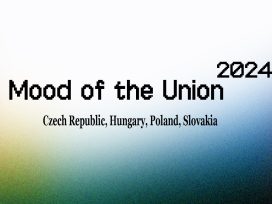Eszter Rádai: You recently headed a major survey of social and cultural attitudes and their relation to economic development. The survey’s findings suggest that Hungary lies eastward on Europe’s map of values in relation to its geographical position on the eastern frontier of western civilization.
György István Tóth: We looked at Hungarian cultural and social values in two dimensions. The first gauges traditional versus secular values. This suggests Hungarians are not especially deferential to authority. Nor are they particularly religious or community-oriented. In this respect Hungarian society is fairly secular, more so than Poland where deference to authority, patriotism, religious and family-centredness are at a greater premium. The second dimension shows where a society is placed along the open and closed society axis, whether attitudes are mainly shaped by physical survival or self-expression, which measures the desire for civil and political freedoms as well as trust in and tolerance for other people. In this respect, attitudes in the Czech Republic, Slovakia, Slovenia, and even in Poland are more open. These are countries where political freedom, tolerance for alternative lifestyles and trust are more highly prized.
The WVS finds a correlation between economic development and a change in values. Economic progress transforms values, the WVS asserts. We, however, cannot be sure whether countries of different cultures progress linearly. Further in-depth surveys are needed before we can say for sure. But one thing is certain: compared with countries with a similar gross domestic product, attitudes in Hungarian society are far less open. Why this should be so is hard to say.
ER: Hungarians are more secular and closer to the West in some ways, yet closer to the Balkans in others – how come?
GIT: Our part of Europe was under one military yoke after WWII. Yet long-term cultural differences are deeply rooted and often prevail. Hungary resembles western culture in various sets of values, but interpersonal and political attitudes are closer to those of Bulgarians, Moldovans and Russians.
ER: Historical bad luck, many believe, has determined Hungary’s pessimistic national character. Do comparative studies bear this out?
GIT: I would caution against going way back in history for an explanation. Until twenty years ago – an historical blink of the eye – Hungary was under the heel of an empire with eastern roots. It took systematic steps to abolish horizontal personal relations while imposing an eastern-style regime alien to traditions in a country where the evolution of the middle class had been repeatedly delayed and interrupted. During four decades of “socialism” Hungarians learned doublespeak and lost confidence in public institutions. Parents pass on such attitudes to their children and it will take some time before future generations think otherwise.
ER: You make clear in your introduction that economic woes cannot be ascribed to people’s attitudes. Yet you come forward with the strong statement that distrust permeates almost all areas of Hungarian private and public life including the economy. What findings prompted that suggestion?
GIT: Our surveys include a question that refers to so-called “generalised trust”: do you trust the majority of your fellows or can you never be too cautious? Another related question: to what extent do you trust Hungarian institutions, politicians, business organisations and government, the media, trade unions and public authorities? Do you believe that they serve our interests and are their actions fair? The third relevant question refers to participation in civil society. How do you value friendship and neighbourly relations; how ready are you to help others or cooperate with them? As for trusting others, Hungarians are not at the bottom of the European list, but trust in the institutions and participation in civil society is extremely low. The consequences can be measured and seen all around us: public institutions operate ineffectively and at a high cost, and morale in general is low.
ER: Is this lack of trust among Hungarians pathological, or just a result of painful historical and everyday experiences?
GIT: No doubt painful experience is a factor. “I cannot get my business done because the authorities don’t care. Right or wrong, I have to get it done through the back door.” Day-to-day frustration undermines public trust even more. As we have no confidence in our institutions, we prefer underhand deals to get our business done. Most people think that the rich prosper at the expense of others. Which means that many people see business as a war in which everybody is against everybody. Nowhere in the world where WVS surveys have been conducted is that belief as strong as in Hungary.
ER: Your research has found that Hungarians are not ready to accept social inequalities and inequalities are thought to be bigger than they actually are.
GIT: True. Although Hungary, in terms of inequalities, is similar to western European countries Hungarians think inequalities are unbearably huge. The Hungarian rich-poor distance is not extreme by European standards. For instance, in Portugal and in the Baltic states inequalities are bigger. True, inequalities are smaller in Scandinavian countries, but they are an exception.
High incomes are not considered legitimate in Hungary. Four-fifths of the respondents think that only dishonest means can make you rich. Only one-third of Hungarians link their success or failure to work, ambition or individual endeavour. Hungary is the only EU country where so few people think that success depends on schooling and where so many think that what matters most is the family you are born into.
ER: In other words Hungarian public opinion is hostile to market forces. This presumably helps to explain nostalgia for the Kádár regime.
GIT: A market economy is more successful than other systems because it can get the most out of society through the synergy of competition and cooperation. To a certain extent competition and cooperation were present already in the Kádár regime, even though it was not dominant. During the 1980s, at a time when the centrally planned economy was on its last legs, some scope was allowed to private enterprise when state-run firms outsourced some of their activities. Market-conscious citizens began to fill the gaps in supply left by clumsy state-run enterprises.
ER: But only as exceptions balancing on the edge of illegality…
GIT: And the government praised them before punishing them by imposing legal penalties. Today the law protects the market economy, market actors, however, all too often prefer shifty manoeuvres to lawful solutions.
ER: This takes us to another feature of Hungarian values: haziness about obeying rules. Whereas Hungarians attribute the success of their peers to dishonesty and rule-breaking they are nevertheless somewhat more tolerant of rule-breaking than people in neighbouring countries. What explains their tolerant attitude to, for instance, tax evasion, while their expectations towards government involvement in social services are so unrealistically high?
GIT: People who spent much of their adult life under socialism cannot change their mentality just because the regime has changed. On the other hand, negative expectations towards the behaviour of other people are a drag on development. Two-thirds of Hungarians see themselves as honest but consider others to be dishonest. We have found that on several occasions when interviewees had to answer the question a) whether in a specific situation the majority would act honestly and b) how would the respondents themselves act.
ER: The conclusion then is that the two statements are contradictory when applied to the entire population. What follows?
GIT: Most people think it is wrong to be corrupt or to break the rules, but they also think that no one can be successful without doing so. Sooner or later they are bound to ask themselves why should I be honest? When it comes to the two-thirds of the people who denounce rule-breaking but think that the majority break the rules, the balance between their own behaviour and the behaviour they attribute to others is probably very delicate. Sooner or later that is bound to create bitter frustration. If such persons are unsuccessful, they will come up with self-exonerating explanations and find scapegoats.
ER: The final report of the survey says that twenty years into the transition, Hungarians – owing to values that are reminiscent of those of the Eastern Orthodox countries – still “undervalue the tax cost of social services. Consequently, they expect more from the state than what it can deliver.”
GIT: Cultural factors probably play a part here. But so do the mistakes made by the ruling intellectual and political elite over the past twenty years. In the relationship of the individual and the state, opinion leaders emphasize the individuals’ rights but soft-pedal their duties. They stress the state’s obligations towards the recipients of social services but they are quiet about the authorities’ duty to press taxpayers to fulfil their obligations.
ER: On both the left and right of the political divide?
GIT: Mostly on the left; but statism has advocates also among conservative opinion leaders. Let me give you an example. Those in charge of welfare policy start out from the perspective of the victims. They tend to forget that life is a series of decisions – both good and bad. General debate puts aside the factor of rational calculation and fails to acknowledge that everybody bears individual responsibility for his fate.
ER: Clearly you are not referring to the hundreds of thousands of Hungarians who have been jobless and downtrodden for generations.
GIT: I am convinced that the victims of the transition should have been treated as mature adult citizens from the outset. Motivated by a partially mistaken left-wing doctrine, the authorities let jobless people become reliant on retirement pension and welfare. They should have known better: the OECD countries that followed a similar course have run into serious difficulties during the Eighties. That policy has stretched the welfare services and increased the desire for greater state redistribution of resources. That is a blend of paternalism and infantilism. When economic growth picked up, the majority of jobless were reluctant to work again. The authorities misread the relation of state and individual: it should have been treated as a contract between equals in which rights and duties are counterbalanced. Attention should not be focused on how much money the state can distribute in welfare and whether or not the related state revenues should be reduced or increased; instead, on what kind of labour market should be created. The overall attitude of professionals towards the state is in favour of redistribution, especially when it comes to their own benefits. I do not just mean opinion leaders but also doctors, teachers, public officials, journalists, actors and the intellectuals of academia. They scramble for their privileges the same as anyone else and do what they can to milk the welfare organisations, wheedling tax allowances and preferential retirement conditions while whining about society moving in the wrong direction. They often camouflage their real intentions by “championing” the cause of the poor. For different reasons, the anti-market attitude is not uncommon among intellectuals either. Such an atmosphere is unhelpful for the operation of a market economy, not to speak about the bad example it sets to the rest of society.
ER: To what extent are politicians responsible for the public’s unrealistically high expectations?
GIT: In two-party and quasi two-party democracies like ours, elections are decided by the median voters. But there is an important difference. In other countries only one of the two big parties courts the votes of those who favour stronger state redistribution while the other woos voters who favour less public spending. Personally I think supporters and the elite of the two parties do not bear the same responsibility in this respect. For several elections now various parties have attempted to win the support of voters that have a stake in a stronger state redistribution of resources. They obviously bear in mind the fact that income from the public coffers accounts for a high percentage – I believe the highest in Europe – of the total income of the median voter. In sum, the tactic pursued by the politicians is all too rational from their own point of view. After all, they can only make it to Parliament if they win the hearts of the voters in the middle.
ER: Which is counterproductive for the general good of the country.
GIT: By consolidating the checks and balances, perhaps it would be possible to keep this “spendthrift democracy” under some control, at least until taxpayers find a better way to stand up for their interests either because one of the big parties undergoes the right transformation or a new political force finds its feet.
ER: Yet the past twenty years could as well be seen as a success story for Hungary: just think of the bloodless transition that inspired thousands of people to become politically active, smoothly operating democratic institutions, every fourth year voters get the chance to dismiss the government, accession to Nato and the EU.
GIT: Whatever you may think, the transition was a deal transacted within sections of the elite. At a conference held at the Hungarian Academy of Sciences which analysed the findings of the Hungarian national survey of the WVS, Tamás Kolosi, president of TÁRKI, said that the transition, Hungary’s gain before 1989, became its drawback afterwards. In Hungary the erosion of the government’s power and, to some extent, steps towards a market economy began in the early 1980s, which means the transition was not limited to a single revolutionary outburst. The transition period was marked by the coexistence of two sets of values: on the one hand, there were institutions of the party-state and large state-owned enterprises; on the other, there were tiny units of private enterprise which exploited the bankruptcy of the system. They relied on a state-owned factory base. Private ventures were a balancing act in the border zone of legality. That mentality, dodging the tax system and disregarding the rules laid down by the law on competition, is not feasible in a market economy. The present crisis is graver in Hungary than it should be, for which the blame should be placed not on too much capitalism but on unjustifiably large vestiges of socialism. Genuine reforms are hindered by distrust by the political forces and the public. As the political forces do not trust one another people try to settle claims on a day-to-day basis. That in turn narrows the time horizons of projects. The all-pervasive distrust weakens the credibility of reforms. Let me illustrate this point with an example from the United States. In the 1990s the administration intended to discontinue a certain category of welfare aid. The day after the aid stoppage was announced protests appeared in the media alleging that “people will starve”. But when the welfare actually stopped it became clear that people did not starve. By that time most of the former beneficiaries had come up with new survival tactics and found other solutions. Only the really needy continued to receive aid and the administration eventually found resources to carry on with aid for that narrower circle of beneficiaries. What would be the response to a similar statement in Hungary? To start with, people would publicly question the government’s will and strength to follow through such a measure. The aid beneficiaries would ignore the policy declaration rather than devise alternative survival tactics, for the simple reason because people do not believe what the government says. To make things worse, such doubt is often justified because many of the proposed reforms never get off the paper.
ER: That is partly because every attempt at reform provokes opposition; and when a proposed reform is to be killed, this or that professional lobby and the political parties in opposition at the time greet themselves as spontaneous allies.
GIT: Such distrust and opposition are known in other countries too, but in Hungary an extremely strong drive is needed to secure any adjustment to a reform; if the impulse is not strong enough, people just shrug it off. As reform programmes do not have credibility they are bound to fail.
ER: If Hungarians do not trust either the political or economic institutions, or their neighbours for that matter, how will they ever find their way out of this quagmire?
GIT: It is difficult to say. Government measures do not generally build confidence. This is not something that campaigns or media hype can solve. Even if every broadcaster showered listeners with the message about the brotherhood of man, no one would bother to listen. To illustrate the point I’ll mention a sensitive issue that recently flared up. The WVS survey has shown that the integration of the Roma in Hungary requires tolerance, empathy and a gradual series of consistent measures. If however the government embarks on this project by accusing the majority society of intolerance day by day and even claims that society’s intolerance is the very source of the problem, its programme will make a bad situation even worse. To restore public confidence, you need patience and perseverance. The real task of a state is to make the sectors that it supervises transparent and credible. Civil servants should stick to a lasting code of conduct; the civil service should not be a pawn of the government of the day. If such advice is heeded, given time, citizens will lend credibility to the public institutions and will not feel the need to hire heavies to enforce the observance of private contracts. Those countries of Europe are successful where public trust is strong, the spirit of cooperation permeates society and public institutions operate predictably and unbiased. We have no other option but to believe that.






